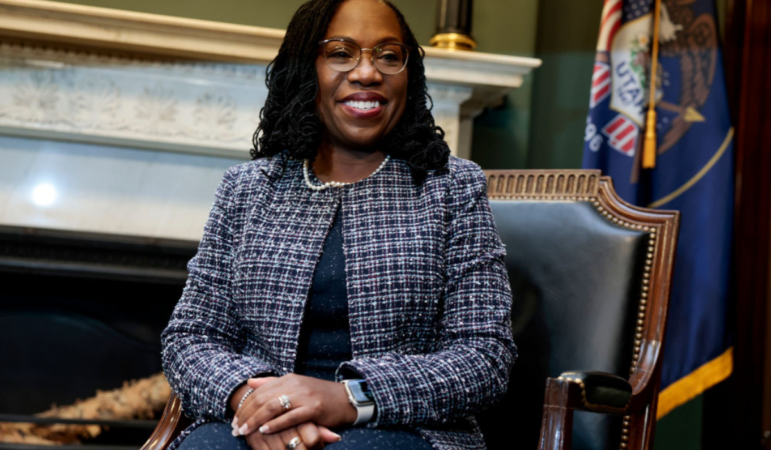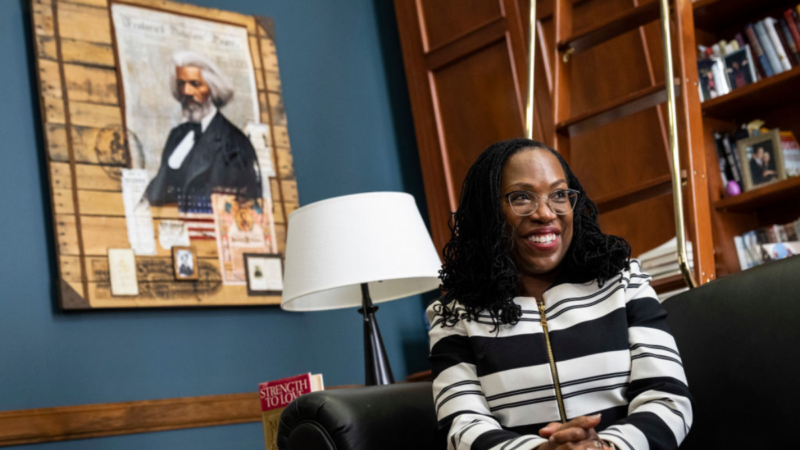Ketanji Brown Jackson’s Supreme Court nomination sparks Black Girl Magic in local judges
Supreme Court nominee Ketanji Brown Jackson meets with Sen. Cory Booker (D-NJ) in Bookers office on Capitol Hill March 8, 2022 in Washington, DC. Supreme Court nominee Ketanji Brown Jackson continued to meet with Senate members on Capitol Hill ahead of her confirmation hearings.
Last month, when President Joe Biden announced Ketanji Brown Jackson’s nomination to the U.S. Supreme Court, Jefferson County Judge Shanta Owens couldn’t believe it. The moment brought her to tears.
“I literally thought about my children and my daughters specifically. Barriers are still being moved everyday so that she has a fair opportunity at everything. So it was a moment of pride for me,” said Owens.
Jackson is the first Black woman to be nominated to the high court. But in Jefferson County, Black women already hold many judgeships with Owens being one of 19 Black women to serve in the court system. Jackson’s nomination had special meaning for them.
Although Owens was excited about the nomination, she was sad it took until 2022 for a Black woman to be nominated to the Supreme Court. She said a change has to happen to bring more Black women to positions of power.
“We have to believe that people of color are just as qualified because we surely are,” Owens said. “We have to want to be inclusive. And I know so many people just probably aren’t as interested in diversity and being inclusive. But I think those are things that you have to want for your state or you have to want for your system.”
Judge Katrina Ross agreed with Owens that it’s long overdue for there to be a Black woman on the Supreme Court. Ross said Jackson is the right pick.

“This particular nominee, she’s more qualified than most of the justices on the court,” said Ross.
Black women on the bench are treated differently, according to Ross.
“They expect more than what they get from any other white judge,” Ross said. “It’s like you’re not competent, like you’re not doing your job. Just like the nominee, she had to be exceptional,” says Ross.
Along with the others, Judge Kechia Davis was excited to see Jackson’s nomination. Davis loved seeing a Black woman with a full life.
“Sometimes you see women who are career driven, but maybe they don’t have a family. But she has everything going on. I mean she’s a wife, mother, she’s ahead in her field. I mean she has everything,” Davis said.
Davis said she appreciates Ketanji Brown Jackson’s beauty and that all Black women can see themselves in her.
“From her natural hair, to the way she speaks, and then she’s a darker-skinned Black woman. Everything about her is just like Black Girl Magic for me,” Davis said.
Black Girl Magic – something the U.S. Supreme Court hasn’t seen in its more than 230 year history.
Confirmation hearings for President Biden’s U.S. Supreme Court nominee Ketanji Brown Jackson starts on Monday, March 21st. You can hear live special coverage from NPR on WBHM and at wbhm.org.
Venezuela approves amnesty that may release of hundreds detained for political reasons
Venezuela's acting president has signed into law an amnesty bill that could lead to the release of politicians, activists, lawyers and many others. The approval marks a stark turn for the nation.
In a historic vote, Tennessee Volkswagen workers get their first union contract
Two years ago, the successful union drive at this plant was expected to spark victories throughout the South. But now, as members vote to make their contract official, momentum has fizzled.
NASA chief blasts Boeing, space agency for failed Starliner astronaut mission
NASA's Jared Isaacman slammed Boeing for failures with its Starliner spacecraft, which was deemed unsafe to return its crew of two astronauts from the International Space Station
Internal memo details cosmetic changes and facility repairs to Kennedy Center
Trump announced his plans to close the Kennedy Center entirely for two years "for Construction, Revitalization, and Complete Rebuilding." The announcement came after many prominent artists canceled existing scheduled appearances.
R&B stars consider two ways to serve an audience
Two albums released the same day — Jill Scott's return from a long absence, and Brent Faiyaz's play for a mid-career pivot — offer opposing visions of artistic advancement in the genre.
Baby chicks link certain sounds with shapes, just like humans do
A surprising new study shows that baby chickens react the same way that humans do when tested for something called the "bouba-kiki effect," which has been linked to the emergence of language.







